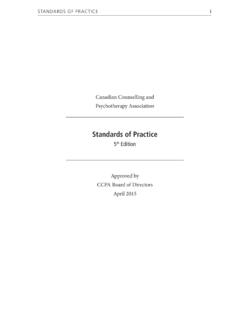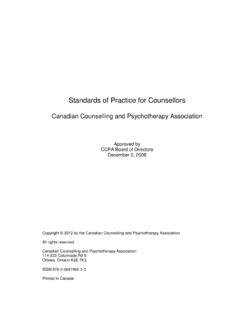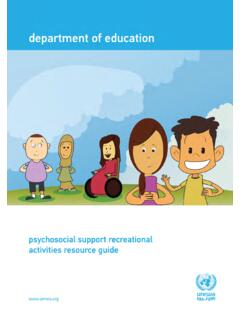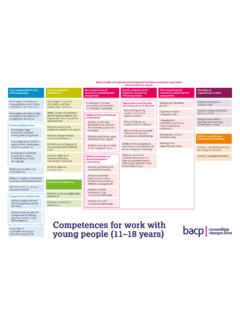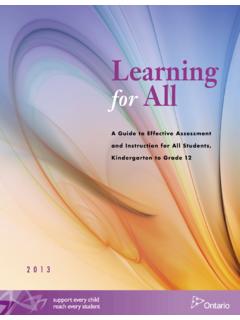Transcription of Standards of Practice
1 7966887809699 ISBN 9780969796688 Standards of Practice Standards of Practice 6th Edition Sixth Edition Standards of Practice iCanadian Counselling and Psychotherapy Association_____Standards of Practice6th Edition_____Approved byCCPA Board of DirectorsApril 2021ii Standards of PracticeCopyright 2021 by the Canadian Counselling and Psychotherapy AssociationAll rights Counselling and Psychotherapy Association 202-245 Menten Place Ottawa, ON K2H 9E8 ISBN 978-0-9697966-8-8 Printed in CanadaStandardS of Practice iiiCanadian Counselling and Psychotherapy Association_____Standards of Practice_____The Standards of Practice (2021) was revised from the 2015 edition and updated by a CCPA Committee consisting of: This document and its companion Code of Ethics would not be possible without the collabora-tion, consultation, and review processes undertaken by the National Board of the Canadian Counselling and Psychotherapy Association and a diverse group of independent volunteer peer reviewers from across Canada.
2 Of particular importance has been the nuanced reviews graciously provided by Indigenous practitioners, Elders, Knowledge Keepers, scholars, authors, and researchers throughout the development process. Lorna Martin ChairJean BlacklerLouise BlanchardJonas BreuhanCorrine Hendricken-EldershawGlenn Sheppard Ethics AmicusTina NashSimon NuttgensKathy Offet-GartnerStandardS of Practice vPreamble ..ixA. Professional Responsibility ..1 General Responsibility ..1 Respect for Rights ..2 Boundaries of Competence ..3 Professional Supervision and Consultation ..4 Representation of Professional Qualifications ..5 Professionalism in Advertising ..6 Responsibility to counsellors /Therapists and Other Professionals ..8 Responsibility to Address Concerns About the Ethical Conduct of Another Professional ..8 Supporting Clients When Ethical Concerns Arise ..10 Third Party Reporting ..10 Sexual Harassment ..11 Diversity Responsiveness ..11 Extension of Ethical Responsibilities.
3 11 Professional Will and Client File Directive ..12B. Counselling Relationships ..14 Primary Responsibility ..14 Confidentiality ..14 Children and Confidentiality ..16 Duty to Warn ..17 Client s Rights and Informed Consent ..18 Touch in Counselling/Therapy ..19 Children and Persons with Diminished Capacity 20 Maintenance of Records ..22 Access to Records ..25 Multiple Relationships3 ..26 Respecting Inclusivity, Diversity, Difference, and Intersectionality ..28 Consulting with Other Professionals ..29 Relationships with Former Clients ..30 Sexual Contact with Clients: Couple, Family, and Group Counselling/Therapy ..32 Multiple Helpers ..33 Group Work ..33 Referral ..34 Closure of Counselling/Therapy ..34 Mandated Clients and Systems Approaches ..35C. Assessment and Evaluation ..36 General Orientation ..36 Informed Consent for Assessment and Evaluation ..36 Assessment and Evaluation Competence ..37 Administrative and Supervisory Conditions.
4 38 Use of Technology in Assessment and Evaluation ..39 Appropriateness of Assessment and Evaluation ..40 Sensitivity to Diversity When Assessing and Evaluating ..41 Reporting Assessment and Evaluation Results ..42 Reporting Assessment and Evaluation Results to Third Parties ..42 Integrity of Instruments and Procedures ..43 Researcher Responsibility ..45D. Professional Research and Knowledge Translation ..45 Participant Welfare ..47 Informed Consent and Recruitment of Research Participants ..48 Voluntary Participation ..48 Research and Counsellor/Therapist Education ..49 Research Participant Right to Confidentiality ..50 Table of Contentsvi Standards of PracticeUse of Confidential Information for Didactic or Other Purposes ..50 Research Data Retention ..51 Further Research ..52 Research Sponsors ..52 Review of Scholarly Submissions ..52 Reporting Research Results ..53 Acknowledging Research Contributions ..53 Submission for Publication.
5 54E. Clinical Supervision Services ..55 General Responsibility ..55 Informed Consent and Confidentiality ..58 Boundaries of Competence ..59 Ethical Commitment ..60 Clarification of Roles and Responsibilities ..60 Welfare of Clients and Protection of the Public ..62 Gatekeeping ..62 Clinical Supervision Orientation ..63 Fees ..64 Relational Boundaries ..64 Due Process and Remediation ..66 Self-Development and Self-Awareness ..67 Self-Care ..68 Diversity Responsiveness ..69F. Consultation Services ..70 General Responsibility ..70 Undiminished Responsibility and Liability ..71 Consultative Relationships ..72 Fees and Billing Arrangements ..72 Informed for Privacy ..73 Recordkeeping for Consultation Services ..74 Conflict of Interest ..74 Sponsorship and Recruitment ..75G. Counsellor/Therapist Education and Training ..76 General Responsibility ..76 Boundaries of Competence ..77 Ethical Orientation ..77 Clarification of Roles and Responsibilities.
6 78 Program Orientation ..79 Relational Boundaries ..80 Confidentiality ..80 Self-Development and Self-Awareness ..81 Dealing with Personal Issues ..81 Self-Growth Activities ..81 Sexual Contact with Students and Trainees ..82 Sexual Intimidation or Harassment ..83 Scholarship ..83 Establishing Parameters of Counselling/Therapy Use of Electronic and Other Technologies ..85 Technology-Based Administrative Functions ..85 Permission for Technology Use ..85 Purpose of Technology Use ..86 Technology-Based Service Delivery ..86 Technology-Based Counselling/Therapy Education ..87 Personal Use of Technology ..88 Jurisdictional Issues ..88I. Indigenous Peoples, Communities, and Contexts ..90 Awareness of Historical and Contemporary Contexts ..90 Reflection on Self and Personal Cultural Identities ..91 Recognition of Indigenous Diversity ..92 Respectful Awareness of Traditional Practices ..92 Respectful Participation in Traditional Practices.
7 93 Standards of Practice viiStrengths-Based Community Development ..94 Relevant Cross-Cultural ..96 Culturally and Ethically Reciprocal Relationships ..96 Appropriate Use of Traditional Knowledge and Cultural Teachings ..97 Honouring Client Autonomy ..98J. Practice Standards as the Beginning of a Journey with Indigenous Peoples and Obtaining Ongoing Informed Consent ..101L. Guidelines for Dealing with Subpoenas and Court Orders ..103M. Guidelines for the Conduct of Custody Evaluations ..105 References ..106 General References ..106 Section References ..107 Glossary of Terms ..114 Standards of Practice ixPreamble These Practice Standards were developed by the Canadian Counselling and Psychotherapy Association to provide direction and guidelines to enable its members, and other counsellors and psychotherapists in Canada1, and counsellors /therapists-in-training, to conduct themselves in a professional manner consistent with the CCPA Code of Ethics.
8 They are also intended to serve the following purposes: support statutory and professional self-regulation by establishing a shared set of expectations related to the many areas of counselling/therapy-related activities and responsibilities; protect the public by establishing a set of expectations for quality counselling/therapy services and for the maintenance of counsellor/therapist accountability; establish a set of expectations for ethically competent professional behaviour which counsellors /therapists may use to monitor, evaluate, and work to improve their profes-sional practices; serve as the foundation for addressing professional queries and ethics-related complaints; and, establish expectations for counsellor/therapist education, supervision, and to provide support for ongoing professional is important to note that these Practice Standards are directly aligned to but distinct from the CCPA Code of Ethics. They contain a set of broad professional values and principles from which counsellors /therapists make professional judgments and decisions.
9 The CCPA Standards of Practice provide action-based guidelines. counsellors /therapists are expected to adhere to both the CCPA Code of Ethics and CCPA Standards of Practice . These Practice Standards are directed primarily at the professional conduct of counsellors /therapists. However, they extend to the personal actions of counsellors /therapists when their behaviour undermines society s trust and confidence in the integrity of the profession and when there is reasonable doubt about the ability of a counsellor/therapist to act in a profession-ally competent and ethical Standards of Practice provisions in this document are more fully understood and their nuanced application to various areas of professional Practice better appreciated when used in combination with each other and with the CCPA Code of Ethics. Multiple new lenses are required to make full, contextualized use of the 2021 CCPA Standards of Practice . One over-arching lens that has recently emerged is the expanded use of electronic and other technology for the delivery of counselling/therapy, supervision, and consultation, which poses unique risks and opportunities throughout the full range of professional practices.
10 Other overarching lenses are those of social justice, self-reflection, and diversity. The importance of the Calls to Action by the Truth and Reconciliation Commission (2015) has been acknowledged and these 2021 Practice Standards begin the process of addressing these calls as well as those of the United 1 Throughout this publication, the term counsellor/therapist shall refer to various titles used by practitioners involved in the activity of counselling including, but not restricted to, the terms psychotherapist, counselling therapist, mental health therapist, clinical counsellor, career counsellor, conseiller/conseill re d orientation, vocational guidance counsellor, marriage and family therapist, orienteur, orienteur professionnel, and psycho Standards of PracticeNations Declaration of Rights of Indigenous Peoples (UNDRIP, 2007). Approaching all clients with humility and from a place of not-knowing is a core value reflected in these /therapists are encouraged to familiarize themselves with the TRC s reports, the Calls to Action, and the UN Standards of Practice , there are textboxes containing informational highlights inserted to succinctly capture some core ethical concept, an ethical principle or concept from case law, and to add authentic voices to enrich meaning.

